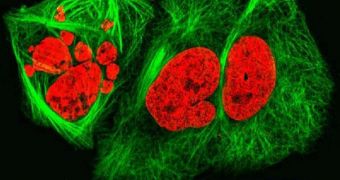Researchers have known for a long time that, as soon as cancer cells start developing inside a host, they release certain chemicals that may be used to track them down. Investigators often refer to these biomarkers as the “scent trail” that tumors leave behind, and methods of enabling drugs to follow up on these leads have been in the works around the world for many years. Now, experts at the Monell Chemical Senses Center believe they are on the verge of creating a new method of detecting cancer cells, PhysOrg reports.
“Cancer tumors result in a change in body-related odors that can be detected both by trained animal sensors and by sophisticated chemical techniques. These findings indicate that odor sensing has the potential to improve early diagnostic and prognostic approaches to lung cancer treatment,” the senior author of the new study, Gary K. Beauchamp, who is also a biologist at Monell, explains. Details of the new investigation appear in the latest issue of the open-access scientific journal PLoS ONE. Data accumulated from this study could set the foundation for the development of new methods of detecting lung-cancer biomarkers, in the urine of patients that developed lung cancer without knowing it.
This line of research makes a lot of sense when considering that lung cancer is the number-one cause of cancer deaths globally, with more than 1.4 million people losing their lives each year. What makes this condition especially lethal is the fact that, in many cases, it does not come with early symptoms, which means that people who have developed it can go for many months, or even years, without knowing they are sick. This allows cancer cells to grow and replicate at will, producing tumors that are often impossible to treat. Metastasis then occurs, and the patient inevitably dies.
“Finding new ways to screen for early lung cancers in patients at risk, such as smokers, is one of the best ways we have to reduce the high death rate from this disease. Using the same chemical approaches as in this paper, we hope to be able to detect odors in urine of smokers that could be used to identify lung cancer at a very early stage,” expert Steven M. Albelda, MD, also a senior author of the new paper, says. He is the William Maul Measey Professor of Medicine at the University of Pennsylvania School of Medicine.

 14 DAY TRIAL //
14 DAY TRIAL //